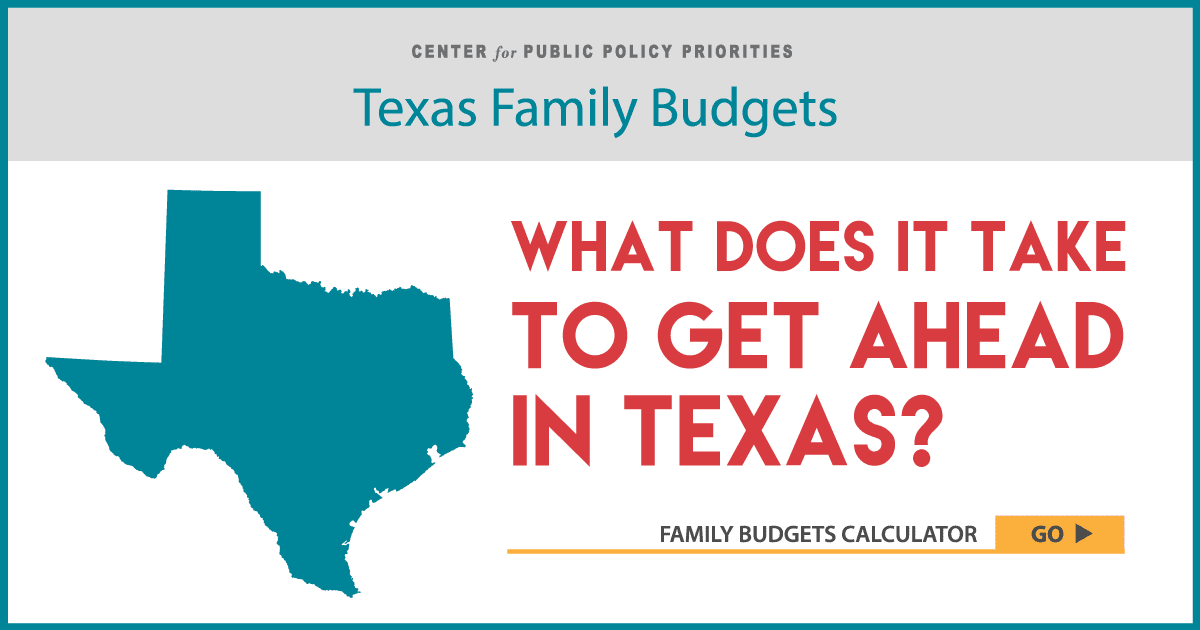When examining the cost of basic needs for several different types of working families in the state’s largest metro areas, it is clear that far too many jobs don’t pay enough for families to pay for their most basic expenses, much less to get ahead by saving for the future. The financial challenges are especially significant for women, according to our updated Texas Family Budgets calculator.
The online calculator allows people to choose from 12 different family types, 27 metro areas and various health insurance and savings preferences to see what it takes for families to make ends meet across Texas. Texas Family Budgets then calculates housing, food, health coverage, child care, and transportation expenses as well as what retirement, emergency and college savings would typically cost in their metro area. Family Budgets also shows what the most common jobs are in each metro area and whether those jobs pay enough for families to make ends meet.
“Families are increasingly dependent on women’s financial security. In Texas, 61 percent of families rely on women’s earnings for all or a significant part of their household income,” said Dena L. Jackson, PhD, Senior Vice President of Grants and Research at Dallas Women’s Foundation, which helped support the update of the Texas Family Budgets calculator. “When women are paid less for the same job, it not only hurts their financial security, but decreases opportunities for the majority of Texas families and negatively impacts our state.“
For example, a single mom with two children who buys the family’s health insurance on the federal insurance Marketplace would need to earn around $39,500 in the McAllen metro area just to make ends meet (without funds remaining for their kids’ college, retirement, etc.). On the upper end, the same family would need to earn approximately $55,100 in the Midland metro area. The differences in these two regions is driven by the cost of housing, health care and child care.
Wage disparities between women and men become truly stark when we look at pocketbook issues. For example, of the most common jobs in Midland, none pay a median wage large enough for a single mom of two kids to pay her basic expenses. If she were a man, three of the top five most common jobs would pay enough. That means single moms would have to make more tough choices, like going without health insurance or using lower-quality child care that could be less safe.
Key findings from the updated calculator:
- For most family types, the McAllen-Edinburg-Mission metro area is the least expensive place for families to live in Texas, while the Midland metro area is the most expensive (even more than Houston or Austin).
- Health insurance would be the first or second largest expense for families if not for employer-sponsored coverage or federal subsidies for those families without employer options. Those subsidies have been under attack in Congress, and cuts could be devastating to Texas families. For example, if the health insurance subsidy was repealed, the cost of health insurance for two-parent, two-child families would increase by $450 to $1300 per month, depending on where they lived.
- The calculator shows how difficult it is for families to save. For many families, saving is an additional “expense” that they must account for in their family budget. So if they do not make enough to cover basic expenses, saving for retirement, their children’s schooling, or for emergencies is often pushed to the side to address more immediate concerns.
- The median cost of child care in Texas metro areas is expensive. When all adults in a household are working, child care is typically the second largest family expense, second only to housing.
Policy Solutions
The good news is that there are policy solutions available to elected officials that research shows will help more women and their families make ends meet, including:
- Raising the minimum wage would increase self-sufficiency for many Texas families.
- Expanding public pre-K to a full day would allow many families to place their preschool-aged child in a safe, educational environment, help children become kindergarten ready, reduce their child care costs, and take a job during school hours.
- Allowing workers to earn sick days protects parents from wage or job loss due to illness. Sick days are also important for spouses suffering from domestic violence and in need of help or to care for sick children.
- Preserving current health insurance coverage policies will help protect Texas children and families’ physical and financial health:
- Do not block grant or cap Medicaid. It would lead to fewer Texans covered, or coverage with limited benefits.
- Renew funding for the Children’s Health Insurance Program (CHIP) – about 400,000 Texas children rely on CHIP to receive the health care they need.
- Protect the federal subsidies for families who buy health insurance on their own. They are under attack in Congress. Without subsidies, family budgets would take an enormous hit, forcing many families to go without health insurance and not get preventive care or postpone necessary treatments for chronic conditions.
- Allowing cities to pass local ordinances that protect low-income renters who use vouchers—the vast majority of whom are women—from housing discrimination.
Visit familybudgets.org to see data for the 27 largest metro areas in Texas and the complete methodology behind the calculator.
